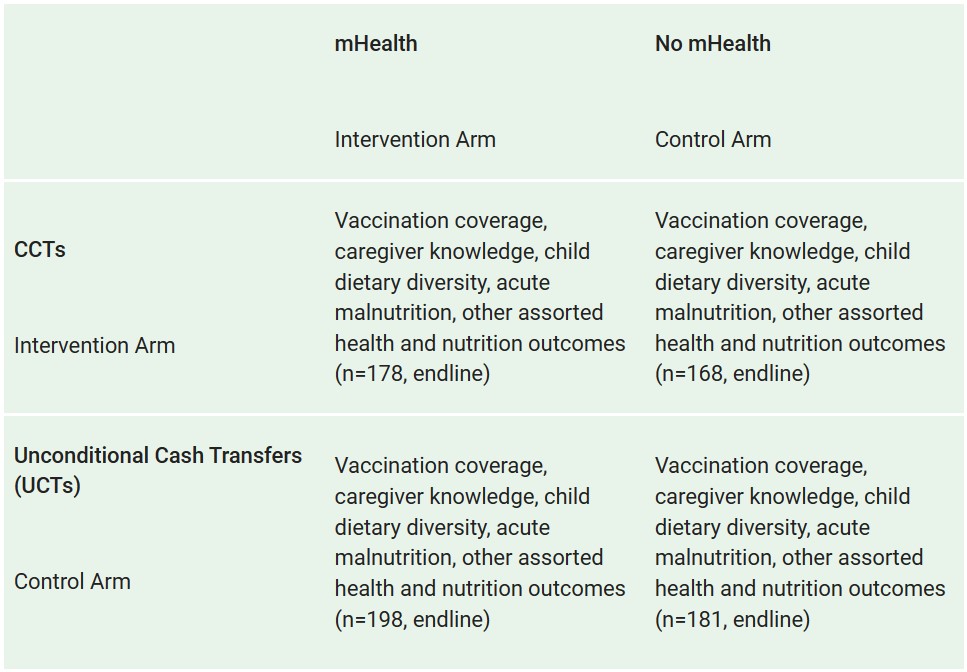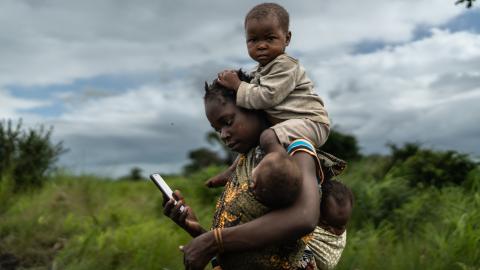Conditional cash transfers combined with audio messaging: Mixed success in Somalia
This is a summary of the following paper: Grijalva-Eternod C, Jelle M, Mohamed H et al (2023) Evaluation of conditional cash transfers and mHealth audio messaging in reduction of risk factors for childhood malnutrition in internally displaced persons camps in Somalia: A 2 x 2 factorial cluster-randomised controlled trial. PLOS Medicine, 20, 2. https://journals.plos.org/plosmedicine/article?id=10.1371/journal.pmed.1004180
This trial analysed the impacts of two interventions - conditional cash transfers (CCTs) and mobile health (mHealth) audio messaging - on assorted health and nutrition outcomes in children aged 0-59 months, using a randomised 2x2 factorial design (Figure 1). The trial took place in peri-urban, internally displaced person camps in Mogadishu, Somalia over a nine-month period. Baseline, midline, and endline measurements were taken.
Figure 1: 2x2 factorial design

The cash transfer programme consisted of USD 70 per household per month for three months, followed by USD 35 per household per month for a further six months. The former reflected 80% of the minimum expenditure basket (cost for one month of essential needs) in the study area. All study participants received the same level of cash transfer, with women being the target recipient within each household.
The cash transfer conditionality intervention was a one-time requirement for all children to attend baseline health screening at a local clinic and receive a health record card.
The mHealth intervention consisted of a series of 30 pairs of health-promoting audio messages. Each message pair contained a two-minute drama and a one-minute reinforcement message transmitted on separate days. Six topics were included: 1) vaccination; 2) water, sanitation, and hygiene; 3) infant and young child feeding practices; 4) identifying signs of serious illness; 5) acute malnutrition treatment; and 6) maximising health and nutrition in the household.
There was no evidence that mHealth increased mothers’ knowledge (health and nutrition), but household dietary diversity did increase (OR 3.75, p<0.001). However, child dietary diversity did not increase significantly, and nor did any of the vaccination outcomes. The mHealth intervention had no effect on the risks of acute malnutrition, measles, all-cause morbidity, and diarrhoea.
The conditional cash transfer significantly improved measles vaccination coverage from 39% to 77.5% (p<0.001) and Pentavalent series completion from 44.2% to 77.5%. However, there was no change in household or child dietary diversity or in mortality, acute malnutrition, diarrhoea, or measles infection incidence over the follow-up period.
The study featured robust methodology and an appropriate sample size calculation. That said, the actual sample size was below what was planned, which may reduce study power and exaggerate any effect size presented. Due to the complexity of the study design, multiple statistical tests were conducted, which in turn increases the risk of erroneous results due to chance. mHealth messages were created with a local company and local dialects, yet they had not been validated prior to this intervention, affecting study reliability.
The researchers provide a clear breakdown of dropouts, deaths, and children lost to follow-up. This is a strength, as we can see that the mHealth + UCT group had a higher proportion of absentees throughout each study point compared to the other groups, which may affect interpretation.
In summary, the interventions did not appear to offer much benefit in the population for the outcomes that were included. However, conditionality of the cash transfer did increase vaccination coverage, which in turn could offer a route to increased participation with local health systems - which may offer further benefits to health and nutrition.


